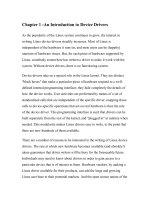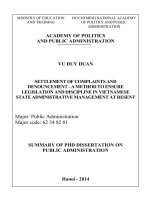Lecture The evolution of management thought (6e) - Chapter 1: A Prologue to the Past
Bạn đang xem bản rút gọn của tài liệu. Xem và tải ngay bản đầy đủ của tài liệu tại đây (499.35 KB, 11 trang )
THE EVOLUTION
OF MANAGEMENT
THOUGHT, 6TH
EDITION
Electronic Resource by:
Regina Greenwood and Julia Teahen
Purpose of this Study
To trace the significant periods in the evolution of management
thought from its earliest days to the present.
www.bigfoto.com
Part One
Early Management Thought
Chapter One
A Prologue to the Past
What can be learned from the history of
management?
What can any of us learn from the past?
FreeDigitalPhotos.net
What can we learn from reviewing the
history of management?
It helps us to integrate our knowledge of
leadership.
It provides a perspective on the past to
apply to the present.
History helps us develop alternatives
because our knowledge has been
broadened and deepened by an
understanding of the past.
“What happened?” is a starting point for
developing new ideas without
“reinventing the wheel.”
A Cultural Framework
The economic facet – relationship of
people to resources
The social facet – relationship of people
to other people
The political facet – relation of the
individual to the state
The technological facet – related to the
art and applied science of making tools
and equipment
People, Management, and
Organizations
The human being is then fundamental
unit of analysis for the study of mankind,
management, and organizations.
Human basic needs and social needs led
to the formation of family and groups, a
primitive hierarchy of organization.
People found advantages in
participating and cooperating with
others to achieve goals.
Figure 1-1: People, management, &
organizations
Management is essential to organized
endeavors.
Persons may be designated to manage; sometimes groups can
come to agreements and manage their efforts. In either case,
however, the activity of management must be present.
Definition
Management is the art of arranging
physical and human resources toward
purposeful ends.









